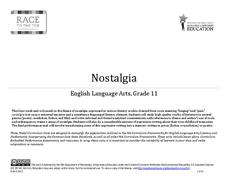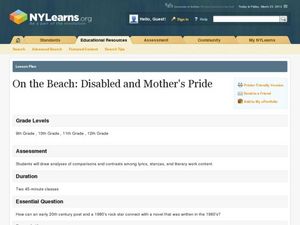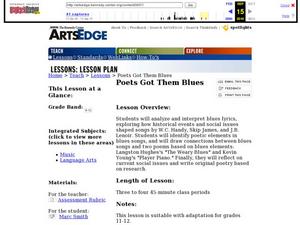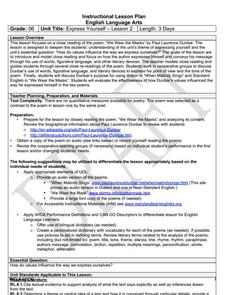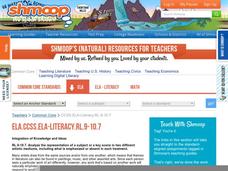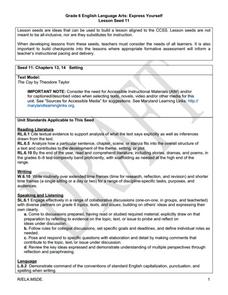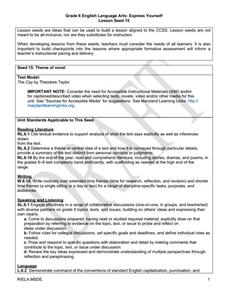Massachusetts Department of Education
Nostalgia
To prepare for crafting their own memoir, class members examine poetry by Margaret Atwood, Billy Collins, Robert Hayden, and Claude McKay, stories by Richard Rodriquez and Willa Cather, and Barry Levinson's film Avalon. They examine how...
Curated OER
Dusty Locks and the Three Bears
Read this twist on Goldilocks and the Three Bears: Dusty Locks and the Three Bears by Susan Lowell. Kindergartners listen, predict, and discuss the story. They then participate in a dramatization of the story and draw a picture to...
Curated OER
On the Beach: Disabled and Mother's Pride
What do an early 20th century poet and a 1980's rock star have in common with a novel from the 1960's? Using Wilfred Owen's poem "Disabled" and George Michael's song "Mother's Pride," learners answer questions about the lyrics and themes...
University of Arizona
Identity Repair
In a detailed, creative writing task, potential poets analyze how race, identity, and society categorize and (mis)represent us. The learning begins with an imaginative anticipatory set where students describe unique situations that their...
Scholastic
Defining Conflict Using "The Interlopers"
Feeling conflicted? Work out those issues with a language arts lesson on internal and external conflict. Using "The Interlopers" by Saki, class members identify the conflicts between the characters before writing their own short stories...
Curated OER
Look in the Mythic Mirror: I've Got Rhythm!
Learners explore the relationships between music, poetry, and visual art. Using the story of Orpheus and Eurydice, pupils develop an awareness of the compositional elements of the Classical style, and the aesthetic effects of those...
Curated OER
Poets Got Them Blues
Contemplate what music learners listen to and why they listen. Can they find poetry within music lyrics? Specifically hone in on blues lyrics and ruminate upon the social issues prevalent in the themes. Particular song lyrics coincide...
National Endowment for the Humanities
Charles Baudelaire: Poète Maudit (The Cursed Poet)
After learning the main ideas of the Decadent movement, learners work in small groups to read and translate poems by the French poet Charles Baudelaire using basic etymology skills. They then read the accurate English translations to see...
Curated OER
6th Grade: Express Yourself, Lesson 2: Close Read
The second instructional activity of a pair about Paul Laurence Dunbar, this plan focuses in particular on his poem, "We Wear the Masks." After a short historical introduction, class members conduct a series or readings, marking up the...
Shmoop
ELA.CCSS.ELA-Literacy.RL.9-10.7
Use this resource's pairings of classical literature and paintings to practice the skill of comparing different artistic mediums with your ELA class. Addressing standard 7 for literature in the Common Core, the resource encourages your...
Curated OER
Our Town: Using Song Lyrics in the Classroom
Bruce Springsteen’s “My Hometown” and Billy Joel’s “Allentown” motivate young lyricists to craft poems about their own home town. Groups compare the two songs, identifying details, symbols, and conflicts. Individuals then picture a place...
Curated OER
"O Captain! My Captain!"
Who was Walt Whitman, and what link does he have to president Abraham Lincoln? After Lincoln's assassination, Whitman wrote "O Captain! My Captain!" This poem and "When Lilacs Last in the Dooryard Bloom'd" are the focus of exercises...
ReadWriteThink
Analyzing Famous Speeches as Arguments
A speaker, a message, an audience. After analyzing these elements in Queen Elizabeth's speech to the troops at Tilbury, groups analyze how other speakers use an awareness of events, and their audience to craft their arguments....
Annenberg Foundation
Gothic Undercurrents
Terror, mystery, excitement. American writers of the 19th century, including Nathaniel Hawthorne, Herman Melville, and Emily Dickinson, used these elements to create morally ambiguous tales that challenged the prevailing belief in...
VH1
Lesson 4: Behind the Movie Chicago
The elements of music and journalistic integrity in one instructional activity; What could be better? The class discusses journalistic approaches to better understand responsible reporting versus sensationalism. They watch the Act One...
Speak Truth to Power
Harry Wu: Forced Labor
Over the course of two class periods, young historians explore human rights issues; specifically, forced labor in China. This resource provides everything you need, including relevant vocabulary, an anticipatory activity, and a...
Curated OER
Interpreting Meaning in Maya Angelou’s “I Know Why the Caged Bird Sings”
Launch a study of Maya Angelou's "I know Why the Caged Bird Sings" with the Youtube video of Alicia Keys singing her "Caged Bird." Groups then read Angelou's poem and discuss the symbols employed. Although the text of the poem is not...
Curated OER
Urban Ecosystems 4: Metabolism of Urban Ecosystems
Cities are compared to living, breathing, metabolizing organisms. Fourth in a five-part series of lessons, this one focuses on the flow of materials through a city. Links to interesting websites and images make your delivery of...
Curated OER
Lesson Plan 2: So What's a Novel, Anyway?
What makes a novel a novel? Class members select a favorite novel, record their impressions on a worksheet, and then come together in groups to discuss the elements common to narrative writing. Next, they identify the characters, the...
Houghton Mifflin Harcourt
Silly Stories: English Language Development Lessons (Theme 1)
ESL/ELD learners are provided extra support with the Houghton Mifflin Harcourt thematic units on silly stories by this packet of activities, exercises, and practice sets.
Museum of Tolerance
Music Evokes Memories and Emotions
Dim the lights, take a deep breath, and press play to explore the emotions and memories that music elicits. Class members begin using relaxation techniques designed to create a positive listening experience. As music plays, learners...
Curated OER
Express Yourself Lesson Seed 11: Setting
Encourage your learners to examine the setting in Theodore Taylor's The Cay. Pupils work in small groups to put together a description of the setting before reading two more chapters of the book. They use their double-entry journals to...
Curated OER
Express Yourself Lesson Seed 15: Theme
Build understanding of theme with an activity designed for The Cay and the Common Core. Small groups or pairs use graphic organizers to determine themes, find and record related details from the text, and formulate theme statements. In...
Trinity University
The Shakespearean Sonnet
Looking for a great lesson to teach your class everything they need to know about Shakespearean sonnets? Here's such a lesson. "Sonnet #18" launches a study of the Shakespearean sonnet. Scholars watch two Prezi presentations that provide...
Other popular searches
- Elements of Poetry Analysis
- Literary Elements of Poetry
- Poetry Elements
- Four Elements of Poetry
- Naming Elements of Poetry
- Thematic Elements of Poetry
- Elements of Poetry Notes
- Teaching Poetry Elements
- Elements of Poetry Lessons
- Elements of Analyzing Poetry
- Structural Elements of Poetry
- Poetry Literary Elements


